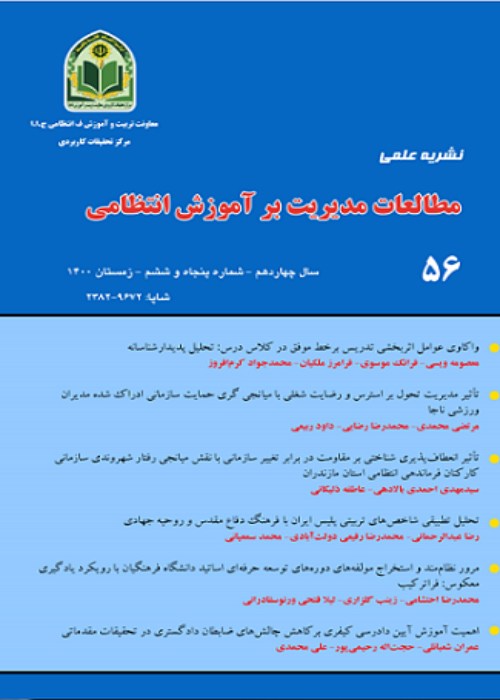Presenting a virtual training model for the users of Faraja drug analysisand detection laboratory
In today's world, virtual education is one of the most important elements in education. The current research was carried out with the aim of providing a technology-based model for the virtual training of users of Faraja's drug analysis and detection laboratory.
The present research method was mixed and exploratory. The participants in the qualitative part of the research include 15 experts who are knowledgeable about the subject (professors familiar with the field of technology with experience in teaching on the Internet platform) using the purposeful sampling method and observing the principle of theoretical saturation, and in the quantitative part of the research including all the laboratory experts. narcotics analysis students of Faraja and laboratory science students of Amin University of Police Sciences and there were 76 people, using Cochran's formula and the available sampling method, 64 people were selected as members of the statistical sample. The data collection tool in the qualitative part was a semi-structured questionnaire, and in the quantitative part, it was a researcher-made questionnaire with an acceptable reliability of 0.84. The method of data analysis in the qualitative part of the foundation data theory and in the quantitative part was the use of the structural equation model. MAXQDA software was used for qualitative data analysis and Smart-Pls software was used for quantitative data analysis.
Axial and selective coding in three causal, contextual and intervening areas of implementation, which led to the identification of 37 organizing themes and 8 inclusive themes in order to formulate the research model. Research showed that education and research 32%, motivation 34%, attitude change 55%, support 42%, technological infrastructure 33%, skill and ability 26%, culture and ethics 47% and structure and policy 60% of the changes. They explain virtual education in Faraja.
The results have led to the formulation of a virtual education model based on modern technology in Faraja, and the final model succeeded in explaining more than 68% of the total changes in virtual education based on technology in Faraja..
- حق عضویت دریافتی صرف حمایت از نشریات عضو و نگهداری، تکمیل و توسعه مگیران میشود.
- پرداخت حق اشتراک و دانلود مقالات اجازه بازنشر آن در سایر رسانههای چاپی و دیجیتال را به کاربر نمیدهد.


